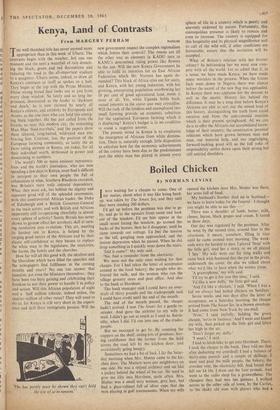Kenya, Land of contrasts
From MARGERY PERHAM NAIROBI crHE well-thumbed title has never seemed more appropriate than in this week of Uhuru. The contrasts begin with the weather, hot sun one moment and the next a waterfall of rain drench- ing the black, green . and red decorations and reducing the road to the all-important stadium to a quagmire. Uhuru seems, indeed, to draw all Kenya's contrasts to itself as spokes to a hub. They begin at the top with the Prime Minister, whose strong broad face looks out at you from every shop window. So lately and so long im- prisoned, .denounced as the leader to 'darkness and death,' he is now claimed by nearly all Kenya's citizens, and certainly by Europeans and Asians, as the one man who can hold this emerg- ing State together. He has just called from the forests, so near this modern city, the remaining Mau Mau 'field-marshals,' and the papers show these littered, long-haired, wild-eyed men em- bracing him. Contrast, too, the position of the European farming community, so lately the de facto' ruling element in Kenya, yet today, for all their individual worth, dethroned in power and diminishing in numbers.
The world's 500 or more eminent representa- tives and the world's journalists, who are now spending a few days in Kenya, must find it difficult to interpret to their own people the fall of colonialism in what, Southern Rhodesia excepted, was Britain's most truly colonial dependency. What, they must ask, lies behind the dignity and apparent good will of the splendid ceremonies, with this controversial African leader, the Duke of Edinburgh and a British Governor-General as the main actors, and with British and Africans apparently still co-operating cheerfully in almost every sphere of activity? Surely Britain has never shown to greater effect her acrobatic skill at turn- ing revolution into evolution. This art, meeting its hardest test in Kenya, is helped by the surging good nature of the Africans and by their elastic self-confidence as they hasten to replace the white man in the legislature, the ministries, the farms, the hotels and the churches.
How far will all this goodwill, the idealism and the liberalism which have filled the speeches and the newspapers find fulfilment in the coming months and years? No one can answer that question, not even the Ministers themselves: they have'been too busy gaining and celebrating their freedom to test their power to handle it in policy and action. Will this African population of eight and a half million tolerate, indeed utilise, the quarter-million of other races? They will need to do so, for Kenya is still very short in the experi- ence and skill these immigrants possess. Will the
.'The bus people must be shown they can't hold the the rest of us to ransom.' new government respect the complex regionalism which fetters their control? The omens are all the other way as elements in KADU turn to KANU's determined ruling power like flowers to the sun. Will the new Kenya Government be able to fulfil its intention for an East African Federation which Mr. Nyerere has again de- manded? This block of Africa cries out for unity, and Kenya, with her young industries, with her growing, enterprising population overflowing her 10 per cent of good agricultural land, needs it most of all. Yet, while Uganda holds back, vested interests in the status quo may crystallise. Will the rush of the landless and unemployed into small farming provide an economic substitute for the capitalised European farming which it is displacing? Kenya's budget is in no condition to stand a negative answer.
The present mood in Kenya is to emphasise the resurgence of Africans from white domina- tion. There is, naturally enough, little disposition to calculate how far the economic achievements of the colony have been due to the predominant part the white man has played in almost every sphere sphere of life in a cotintry which is poorly and unevenly endowed by nature. Fortunately, this cosmopolitan presence is likely to remain and even to increase. The country is equipped for this hospitality and its physical magnificence and its call of the wild will, if other conditions are favourable, ensure that the invitation will be accepted.
What of Britain's relation with her former colony? In befriending her we must now com- pete with all the world. Let us admit that if, in a sense, we have made Kenya, we have made many mistakes in the process. When the Union Jack went down in Nigeria there was silence before the ascent of the new flag was applauded. In Kenya there was applause for the descent as well as the ascent. History lies behind the difference. It may be a long time before Kenya's Africans are able to sort out the mixed load of this history, distinguishing the truth from racial emotion and from the anti-colonial reaction which is their present springboard. All we can do is to offer the Africans our accumulated know- ledge of their country, the constructive personal relations which have grown between man and man, our material help, and our ungrudging, forward-looking good will as the full yoke of responsibility settles down upon their strong but still untried shoulders.






























 Previous page
Previous page